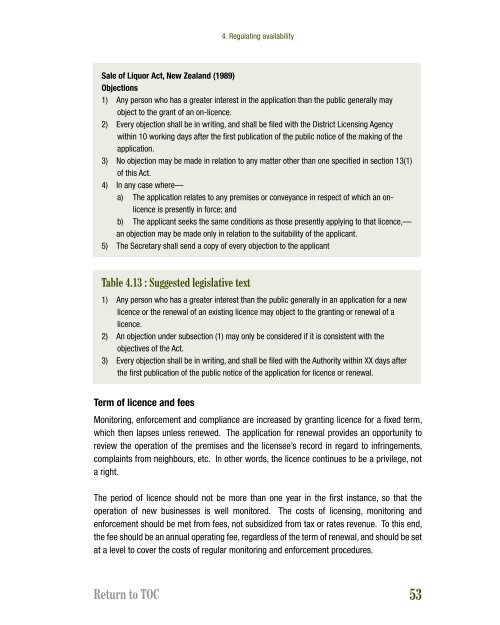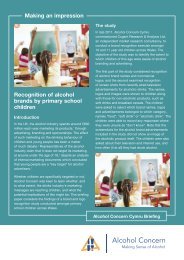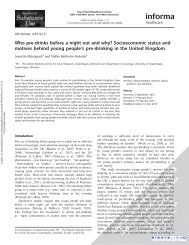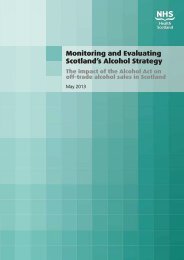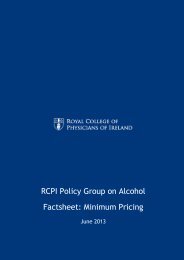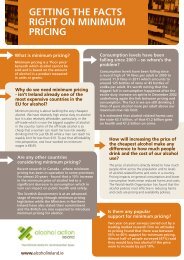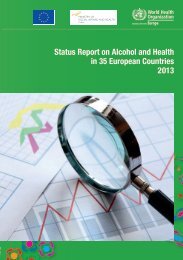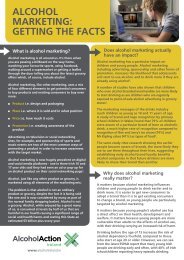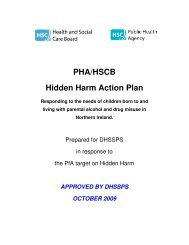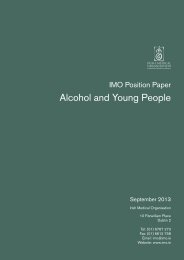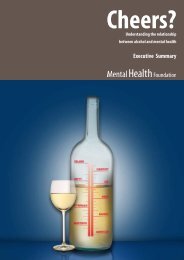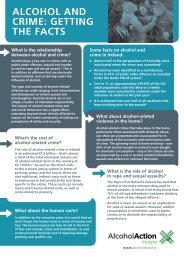Addressing the harmful use of alcohol - WHO Western Pacific Region
Addressing the harmful use of alcohol - WHO Western Pacific Region
Addressing the harmful use of alcohol - WHO Western Pacific Region
Create successful ePaper yourself
Turn your PDF publications into a flip-book with our unique Google optimized e-Paper software.
4. Regulating availability<br />
Sale <strong>of</strong> Liquor Act, New Zealand (1989)<br />
Objections<br />
1) Any person who has a greater interest in <strong>the</strong> application than <strong>the</strong> public generally may<br />
object to <strong>the</strong> grant <strong>of</strong> an on-licence.<br />
2) Every objection shall be in writing, and shall be filed with <strong>the</strong> District Licensing Agency<br />
within 10 working days after <strong>the</strong> first publication <strong>of</strong> <strong>the</strong> public notice <strong>of</strong> <strong>the</strong> making <strong>of</strong> <strong>the</strong><br />
application.<br />
3) No objection may be made in relation to any matter o<strong>the</strong>r than one specified in section 13(1)<br />
<strong>of</strong> this Act.<br />
4) In any case where—<br />
a) The application relates to any premises or conveyance in respect <strong>of</strong> which an onlicence<br />
is presently in force; and<br />
b) The applicant seeks <strong>the</strong> same conditions as those presently applying to that licence,—<br />
an objection may be made only in relation to <strong>the</strong> suitability <strong>of</strong> <strong>the</strong> applicant.<br />
5) The Secretary shall send a copy <strong>of</strong> every objection to <strong>the</strong> applicant<br />
Table 4.13 : Suggested legislative text<br />
1) Any person who has a greater interest than <strong>the</strong> public generally in an application for a new<br />
licence or <strong>the</strong> renewal <strong>of</strong> an existing licence may object to <strong>the</strong> granting or renewal <strong>of</strong> a<br />
licence.<br />
2) An objection under subsection (1) may only be considered if it is consistent with <strong>the</strong><br />
objectives <strong>of</strong> <strong>the</strong> Act.<br />
3) Every objection shall be in writing, and shall be filed with <strong>the</strong> Authority within XX days after<br />
<strong>the</strong> first publication <strong>of</strong> <strong>the</strong> public notice <strong>of</strong> <strong>the</strong> application for licence or renewal.<br />
Term <strong>of</strong> licence and fees<br />
Monitoring, enforcement and compliance are increased by granting licence for a fixed term,<br />
which <strong>the</strong>n lapses unless renewed. The application for renewal provides an opportunity to<br />
review <strong>the</strong> operation <strong>of</strong> <strong>the</strong> premises and <strong>the</strong> licensee’s record in regard to infringements,<br />
complaints from neighbours, etc. In o<strong>the</strong>r words, <strong>the</strong> licence continues to be a privilege, not<br />
a right.<br />
The period <strong>of</strong> licence should not be more than one year in <strong>the</strong> first instance, so that <strong>the</strong><br />
operation <strong>of</strong> new businesses is well monitored. The costs <strong>of</strong> licensing, monitoring and<br />
enforcement should be met from fees, not subsidized from tax or rates revenue. To this end,<br />
<strong>the</strong> fee should be an annual operating fee, regardless <strong>of</strong> <strong>the</strong> term <strong>of</strong> renewal, and should be set<br />
at a level to cover <strong>the</strong> costs <strong>of</strong> regular monitoring and enforcement procedures.<br />
Return to TOC<br />
53


